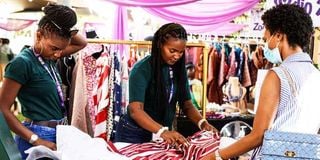Women in international trade are Kenya's hidden economic engine

A potential customer samples items on sale at a Nairobi expo meant to empower women entrepreneurs in showcasing their talents in 2021.
In recent years, Kenya has made significant strides in promoting gender equality and empowering women in various sectors of the economy. However, the role of women in international trade, in particular, has often gone unnoticed.
Despite numerous challenges, women entrepreneurs in Kenya are quietly becoming a powerful force in the country’s international trade landscape.
They are not only driving economic growth but also helping to build a more inclusive and sustainable economy.
According to International Trade Centre (ITC), data, women-owned businesses account for around a third of all small- and medium-sized enterprises (SMEs) in Kenya.
Despite this, women entrepreneurs still face significant obstacles when it comes to accessing finance, markets and information. This is particularly true in the realm of international trade, where women often lack the networks, resources and knowledge needed to successfully compete in global markets.
But this is beginning to change as more women entrepreneurs in Kenya are breaking down barriers and taking their businesses global. They are doing this by forming networks, sharing information and resources, and seeking out new market opportunities.
The government, through the Ministry of Trade and Industrialisation, has also implemented programmes to promote women’s participation in trade-related decision-making.
This includes ensuring that women are represented in trade negotiations, trade-related committees and boards and other decision-making bodies.
By having women’s voices and perspectives represented at these levels, trade policies and agreements can be designed to be more inclusive and responsive to the needs of women entrepreneurs.
Through bodies such as the Organization of Women in International Trade (OWIT), a national network that brings together women entrepreneurs from across Kenya to support one another in international trade, women entrepreneurs have access to a range of services.
These include trade information, market research and business training, and networking opportunities. That helps them to identify new market opportunities, develop their products and services and build relationships with buyers and suppliers.
Many challenges
Despite these efforts, there are still many challenges that these women face when it comes to international trade. For example, many still lack access to the information, networks and resources needed to successfully compete in global markets.
This is particularly true in the areas of trade policy, trade finance and export promotion. Furthermore, the Covid-19 pandemic made it more difficult to access markets and finance and adapt to the ‘new normal’.
But as more women entrepreneurs in Kenya break down barriers and take their businesses global, the future looks bright.
With the right support and resources, they can become a powerful force in the country’s international trade landscape. They can drive economic growth, create jobs and build a more inclusive and sustainable economy.
A key initiative the government can implement to assist these women is the establishment of a Women Export Fund. That would provide trade finance to women to help them to start or expand their businesses with a focus on the international export sector.
It can be used for purposes such as purchasing equipment, investing in technology, international expos or training employees. Providing access to finance could help women exporters to overcome one of the biggest barriers to participating in international trade.
It is important that the government, private sector and other stakeholders continue to provide the necessary support to overcome the challenges women entrepreneurs in Kenya's face. This can be done by providing access to finance, information, networks and resources. By doing so, we will not only empower women entrepreneurs but also contribute to the overall economic development.
Ms Wamae is an advocate of High Court of Kenya and gender and diversity advisor. [email protected].




